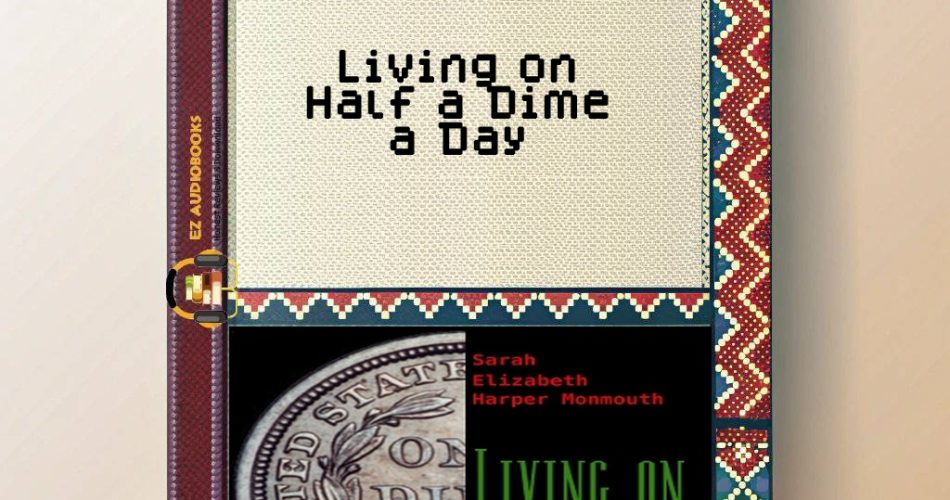Audiobook Sample
Listen to the sample to experience the story.
Please wait while we verify your browser...
- Title: Living on Half a Dime a Day
- Author: Sarah Elizabeth Harper Monmouth
- Narrator: Sue Anderson
- Length: 01:16:27
- Version: Abridged
- Release Date: 01/01/2016
- Publisher: LibriVox
- Genre: Self Development, Health & Wellness
- ISBN13: SABLIB9782093
There’s a particular kind of alchemy that happens when a narrator’s voice breathes life into historical words – a transformation I first understood while driving through Chile’s Atacama Desert, where Gabriel GarcÃa Márquez’s magical realism became inseparable from the cracked earth outside my rental car window. That same alchemy courses through Sue Anderson’s narration of “Living on Half a Dime a Day”, Sarah Elizabeth Harper Monmouth’s extraordinary 1870s memoir about surviving on $40 a year after financial ruin.
Monmouth’s story unfolds like a patchwork quilt stitched with equal parts desperation and ingenuity – each chapter revealing another square of her resourcefulness. When her government bonds collapsed (a Gilded Age echo of our modern financial crises), this Civil War widow transformed her New Hampshire homestead into a laboratory of frugality: boiling oatmeal into week-long desserts, crafting shoes from rubber scraps, and – most movingly – guarding her $10 annual book budget as sacred. Her description of reading in bed during winter, mittened hands clutching borrowed newspapers while breath crystallized in the air, transported me to Oaxacan evenings where grandmothers spun survival tales by firelight. Both moments remind us how stories become lifelines when material comforts vanish.
Anderson’s narration captures Monmouth’s voice with remarkable texture. She delivers the pragmatic budgeting sections (“$17 for food, $13 for fuel”) with the crisp efficiency of a ledger keeper, then melts into vulnerable warmth during passages about literature being Monmouth’s “humored child.” Listen for the subtle crack in Anderson’s voice when describing how Monmouth’s paper mosaics – crafted from donated wallpaper samples – became both income source and spiritual salvation. The audiobook’s intimate quality makes you feel like you’re sitting at Monmouth’s kitchen table as she recounts trading floral garlands for sacks of flour.
What makes this memoir extraordinary isn’t just its historical snapshot of post-Civil War poverty (though anthropologists will cherish details like repurposing cigar boxes as storage). It’s Monmouth’s radical redefinition of wealth: ‘My mind is the humored child’ could be a manifesto for intellectual abundance amid material scarcity. Modern parallels abound – from pandemic-era sourdough starters to #VanLife minimalism – but Monmouth’s systematic, almost poetic approach to deprivation (turning fireplace ash into garden fertilizer, calculating exact boiling times to conserve firewood) feels uniquely visionary.
That said, 21st-century listeners might bristle at Monmouth’s romanticization of hardship. Her claim that poverty ‘strengthened my character like winter tempests strengthen pine trees’ glosses over systemic inequities – a tension Anderson navigates by letting the text speak for itself. The audiobook format particularly shines in sections where Monmouth’s folk-art business takes off; you can practically hear the rustle of visitors’ petticoats as Anderson narrates the “New York Times” correspondent’s awe at her ‘strange, curious’ paper mosaics.
Compared to modern frugality guides like “The Simple Living Guide”, Monmouth’s memoir lacks actionable advice (no one today could survive on her five-cent meal plans). But as a portrait of creativity flourishing within constraints, it rivals “The Glass Castle” or “Educated”. The free LibriVox production does mean occasional audio imperfections – a distant dog bark during the firewood chapter, slight microphone pops when Anderson voices Monmouth’s triumphant ‘I rule!’ declaration – but these only deepen the sense of listening to a recovered artifact.
For writers, the most breathtaking passages detail Monmouth’s ‘thinking bed’ ritual: wrapping herself in quilts to mentally replay books when too cold to hold them. As someone who’s chased stories from Lisbon to Laos, I recognized that sacred space where imagination compensates for physical limitation. Whether you’re a history buff, budgeting enthusiast, or simply someone who believes in books as salvation, this audiobook is a copper-coin treasure.
With a traveler’s appreciation for stories that outlast their tellers,
Marcus Rivera

